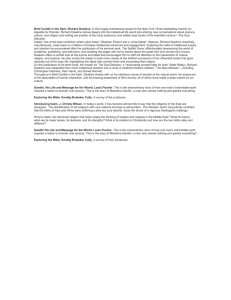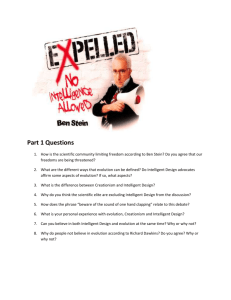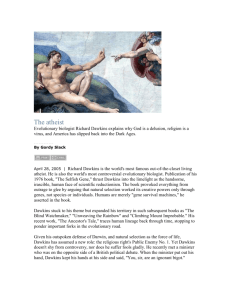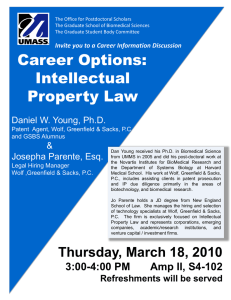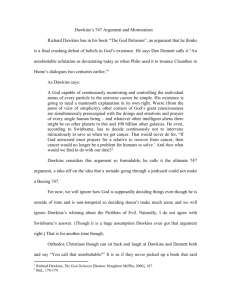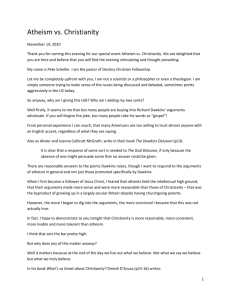LP9_AtheismScience
advertisement
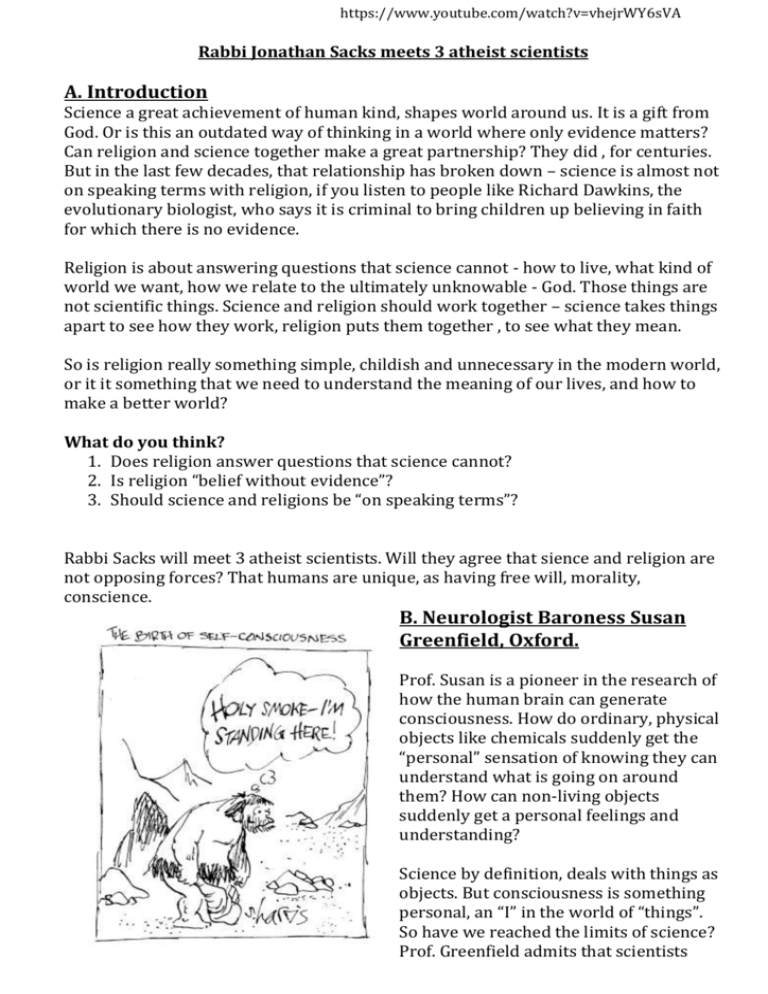
https://www.youtube.com/watch?v=vhejrWY6sVA Rabbi Jonathan Sacks meets 3 atheist scientists A. Introduction Science a great achievement of human kind, shapes world around us. It is a gift from God. Or is this an outdated way of thinking in a world where only evidence matters? Can religion and science together make a great partnership? They did , for centuries. But in the last few decades, that relationship has broken down – science is almost not on speaking terms with religion, if you listen to people like Richard Dawkins, the evolutionary biologist, who says it is criminal to bring children up believing in faith for which there is no evidence. Religion is about answering questions that science cannot - how to live, what kind of world we want, how we relate to the ultimately unknowable - God. Those things are not scientific things. Science and religion should work together – science takes things apart to see how they work, religion puts them together , to see what they mean. So is religion really something simple, childish and unnecessary in the modern world, or it it something that we need to understand the meaning of our lives, and how to make a better world? What do you think? 1. Does religion answer questions that science cannot? 2. Is religion “belief without evidence”? 3. Should science and religions be “on speaking terms”? Rabbi Sacks will meet 3 atheist scientists. Will they agree that sience and religion are not opposing forces? That humans are unique, as having free will, morality, conscience. B. Neurologist Baroness Susan Greenfield, Oxford. Prof. Susan is a pioneer in the research of how the human brain can generate consciousness. How do ordinary, physical objects like chemicals suddenly get the “personal” sensation of knowing they can understand what is going on around them? How can non-living objects suddenly get a personal feelings and understanding? Science by definition, deals with things as objects. But consciousness is something personal, an “I” in the world of “things”. So have we reached the limits of science? Prof. Greenfield admits that scientists don’t even know what sort of “thing” consciousness is, if it is a thing. And if they don’t know that, they can’t investigate it. According to science, consciousness is something that has no place in the physical world. On the other hand, it is religion, ancient as it is, that speaks of the free-will, choice, responsibility, things that make us human. For Prof. Susan, even though she is an atheist, the important thing is to have an open mind, to challenge everything, and to be able to accept that you might be wrong. That means that religious people should not be afraid to question the evidence for their beliefs. It also means that scientists should not be afraid to recognize that there may be non-physical aspects to the universe, that science cannot adequately describe or explain. For her, science and religion can be two sides of the same coin, two totally different things, but both can be true in their own way. What do you think? 1. Which better describes the human person – science (human beings are nothing more than collections of atoms and molecules) or religion (man is a conscious, free and responsible being?) Why? 2. Do you think consciousness is something science could one day explain ? Or is it impossible to talk about something personal like consciousness, in the physical language of science? 3. Do you agree with Prof. Greenfield that the important thing, is to have a questioning, and open mind, whether you are a scientist or a religious believer, or do you think it is OK to think you are 100% right and refuse to discuss things any more? C. Theoretical physicist Professor Jim Al-Khalili, Imperial College. Prof. Jim: Religious people interested in who, why, scientists – how. The laws of physics are just there – there is no meaning or purpose to them, but religious people say there is. Religion used to say “God did it” because no one knew any better but science has been explaining more and more, so religion is on the retreat. Even now scientists are looking at what happened before the Big Bang. Rabbi Sacks: The “God of the Gaps” argument is a very bad argument – religious people would agree that it is not an explanation to say that “God did it”. Religion is not on the retreat, because religion says that God made us with intelligence and He wants us to know about creation to understand greatness of universe and smallness of us. So every advance for science is also an advance for religion, and an advance of the religious person’s understanding of the greatness of the Creator. In this way, both atheists and religious people have a shared awe at wonder of the universe. What do you think? 1. Do you agree that religion is “on the retreat” from science, or do you think that every advance in science tells us more about the wonder and greatness of God? 2. Atheists stand in awe before the complexity and immensity of the universe, and leave it at that. Religious people turn their awe into thanks and praise for the God they see to be behind it. Does that mean that atheist scientists and religious people should be “in conflict”? D. Professor Richard Dawkins. Evolutionary biologist. Dawkins is Britain’s best known atheist, leading the scientific attack on religion – in his best-selling book “The God Delusion” , Dawkins says that religious belief is ignorance, and superstition - an insult to all thinking people and to science. For Dawkins, God is “as real” as fairies. Prof. Dawkins: My advice is “If someone can’t give you evidence for something, don’t believe it”. I believe that the Bible is not really historical, and it makes me angry that religious people don’t care if the stories in it are true, partly true or not true. Rabbi Sacks: Belief in God is not like belief in fairies, because God really did intervene in human history – in the lives of Abraham, Moses. Some of the writing may be more story like, than factual, but this is because the Bible uses stories just like you would tell your daughter stories when she was young. God told us stories when our civilization was still in its childhood, so that people could easily understand God and how to live . Did the Bible stories really happen? As I just explained, the whole point of the Bible stories is to tell us how to live. I do believe, however, that these stories are based on historical facts – it is only because the sacrifice of Isaac by Abraham really happened, that Jews alone, out of all the people in the ancient world, learnt that it was not right to practice child sacrifice, and not to treat their children as if they were just their own property. That story made a big change in Jewish culture. Religion is a force from good – it teaches us about how to live in the right way. Research also shows that it is more likely for a religion person than a secular person to donate to charity and to do voluntary work. Prof. Dawkins: I agree that science can be just as much a force for evil as religion can. In fact, if you really want to do evil, you had better be good at science, as science is the most efficient way to do anything! Also if you tried to use science to tell others how they should live, I agree that this would also be a disaster – someone could take Darwin to mean that we should get rid of all weak people, as only the strong and fit survive. Rabbi Sacks: so science doesn’t tell us about what sort of society we should live in. If Darwin is misused, it doesn’t mean Darwin was wrong, or bad. Similarly, if religion is misused (by terrorist fundamentalists) that doesn’t mean that religion is wrong, or bad. The answer to bad science is not “no science”, but good science. And the answer to bad religion is not “no religion”, but good religion. Whether we are atheists or religious, we need to value human rights, human dignity, respect the truth, be open and willing to question, and pursue knowledge. What do you think? 1. Do you think it matters if some of the bible stories are not factually or scientifically true? Why? 2. How can religion be a force for evil? Explain with an example. 3. Do you think science can be a force for evil? Explain with an example. 4. Do you think someone like Dawkins and Sacks can get along to make society a better place? How? Conclusion All too often, science and religion are seen as having nothing in common, but they actually have much in common. Both religion and science can be united in the desire to pursue a common good. Science talks about our origin - religion talks about our purpose; science talks about the world that is – religion talks about the world that ought to be. God made us in love and forgiveness, asking us to love and forgive others. Add that to science, and it equals hope. What do you think? What is your final view? Can science and religion make a good partnership?
